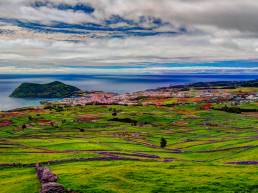At a time when Portugal continues to work to extend its continental sea shelf, Renato Mendes will develop a project to increase the knowledge of the Atlantic Ocean, more regularly, in a partnership that also aims to bring together several scientific areas.
The journey of the Caravel, the name of this autonomous surface vehicle (ASV), between Porto and the Azores Archipelago, will be the culmination of a long process of software development, adjustment of processes, and teamwork that goes far beyond the oceanographer Renato Mendes.
The CoLAB +Atlantic researcher realized that there are only advantages in working together and decided to present a project that aims to do just that: a close partnership between oceanographers and engineers. According to the researcher, in this type of project usually each does his/her tasks and in the end both come together. The lack of interactivity means that resources are used that, for the end user – the oceanographer – have no implication.
“From the point of view of engineering more precision makes sense, but from the point of view of oceanography it makes no difference.” – Renato Mendes, winner of FLAD’s Science Award Atlantic 2021.
Renato Mendes realized this in the work he develops at CoLAB +Atlantic and wanted to translate this spirit into the project that won the edition of FLAD’s Science Award Atlantic 2021, the JUNO – Robotic Exploration of Atlantic Waters.
This project is born out of a deeper need that he felt as an oceanographer, which is the lack of data to study the Atlantic Ocean, something so vital for Portugal, especially given that the acquisition of data in the ocean and its free sharing between institutions, scientists, and citizens is one of the fundamental objectives of the United Nations Decade of Ocean Science for Sustainable Development (2021-30).
“Compared to other countries in Europe, even those with small sea areas, we have very little data. We don’t have a strategy in place. The projects are done, the funding runs out, and there is no maintenance of the project. This causes us to run out of long data series in oceanography. For those studying climate change, it is impossible to evaluate something without a long series of data. We always have the tendency, and in Portugal, this side of oceanography is enormously studied, to use remote detection data – satellite – or else use models, create scenarios, to try to study long-term changes because we have this lack of data.” – Renato Mendes, winner of FLAD’s Science Award Atlantic 2021.
The need to have data is increasing, but these data collection trips are rare and financially expensive. This is where the JUNO project starts. The researcher proposes to develop the software and evaluate the operational test of an autonomous surface vehicle (ASV), with national partners as the CoLAB +Atlantic and the Laboratório de Sistemas e Tecnologias Subaquáticas of the Faculty of Engineering at Porto University and, as an American partner, the Prof. Pierre Lermusiaux, at MIT.
The Caravel is an entirely sustainable vehicle, powered by the energy generated by the waves, and with some solar panels for days of less tide, which will allow more trips to collect data on important issues such as marine pollution, noise monitoring, and fishing in the ocean, among many others.
In the end, the goal is for this type of vehicle to become another resource – that is more flexible, economically viable, and environmentally sustainable – to add to the Atlantic observation network, and possibly be able to coordinate with other types of autonomous vehicles and thus expand the knowledge we have of the Atlantic.
Related Posts
7 de March, 2024
Open Call: Island Biogeography and Macroecology Summer School Azores 2024
Applications are open until April 7.…
15 de January, 2024
FLAD Science Award Mental Health 2024 – 2nd Phase
Applications for the 2nd phase of the…



